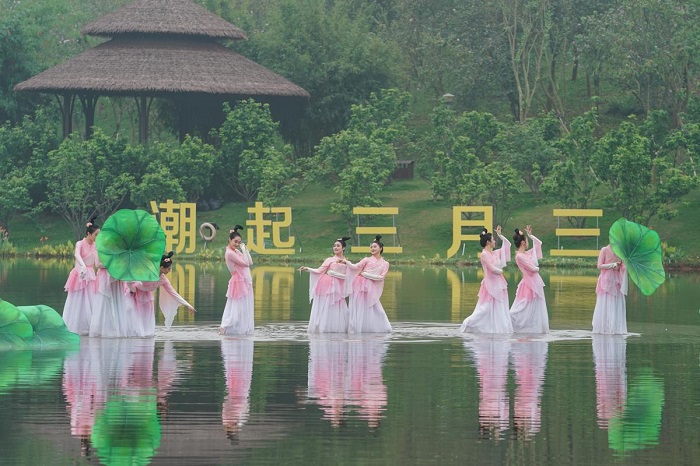Folk festival holidays help attract tourists

Dancers perform at the Sanyuasan Festival open ceremony in Nanning, capital of Guangxi Zhuang autonomous region on April 11, 2024. [Photo by Chen Guanyan/for chinadaily.com.cn]
Some ethnic groups' folk festivals have boosted tourism in China's border cities with their hospitality and cultural riches.
People in Southwest China's Guangxi Zhuang autonomous region have just finished their four-day Sanyuesan Festival. Held from the third day of the third month in the Chinese lunar calendar, it is a traditional festival for the region's Zhuang ethnic group.
The regional government gave people working and living in Guangxi a four-day break — one day more than last year — starting from April 11.
In December 2013, the State Council, China's Cabinet, revised the nation's holiday management rules to allow provinces and regions with clusters of ethnic groups to decide the dates and durations of their folk festival holidays.
Guangxi took steps to boost tourism and promote the Sanyuesan Festival before the holiday. It started to hand out tourism coupons from April 1, with the region's 138 scenic spots allowing free admission and 45 attractions halving ticket prices until April 30. Eighty-eight starred hotels in the region offered half-price accommodations to travelers during the Sanyuesan holiday.
The holiday attracted more visitors, with China Railway Nanning Group Co, headquartered in the regional capital, Nanning, tallying a record high 811,000 passenger trips on Thursday, the first day of the holiday.
Guangxi also witnessed marked growth in international travelers during the holiday, such as those from Vietnam. Dongxing, a city on the border with Vietnam, said that it had seen 38,600 outbound trips and 36,600 inbound trips as of 6 pm Saturday. It expected a total of 120,000 entries and exits over the holiday.
"The Sanyuesan Festival is closely related to the traditional Shangsi Festival (for Han people), which also falls on the third day of the third month in the Chinese lunar calendar," said Liu Jixuan, a lecturer from Guangxi Minzu University in Nanning.
He said that written records of the Sanyuesan Festival has a long history and the festival now celebrates thankfulness, ancestor worship, prayers for a good harvest, marriage and children, as well as featuring plenty of entertainment.
He said that people organize family gatherings and entertainment activities such as throwing embroidered balls and singing folk songs. They also prepare five colors of cooked glutinous rice — white, black, yellow, purple and red — by using herbal juices.
Hu Yangyang, from the eastern province of Zhejiang, visited Guangxi over the Sanyuesan Festival. She said it was her first time in Dongxing, and she was surprised by the food there.
"We had a good time there," she said.
Other provinces and regions have their own folk festivals and holidays. Yunnan province in Southwest China started to celebrate the water sprinkling festival this month, with the timing of the celebration differing in various locations.
For example, the Dehong Dai and Jingpo autonomous prefecture in Yunnan gave residents a four-day break for the festival from Thursday, while the holiday in Xishuangbanna will last three days from Monday.
"April is a month with a great many folk festivals," the Tuniu travel portal said. "Celebration activities organized at these festivals are attracting people to experience the diverse cultures and customs of different ethnic groups."














